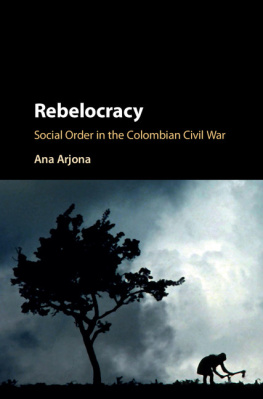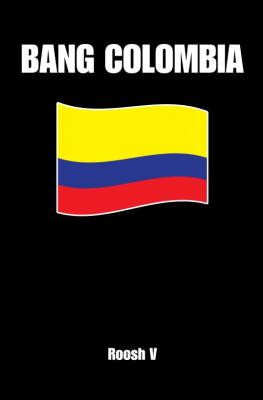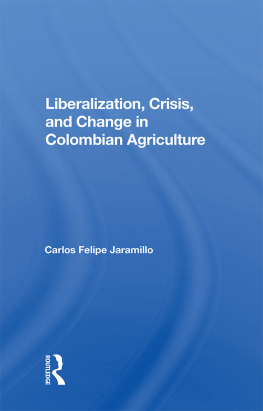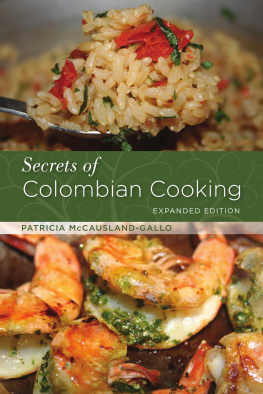Arjona - Rebelocracy : Social Order in the Colombian Civil War
Here you can read online Arjona - Rebelocracy : Social Order in the Colombian Civil War full text of the book (entire story) in english for free. Download pdf and epub, get meaning, cover and reviews about this ebook. year: 2017, publisher: Cambridge Univ Pr, genre: Politics. Description of the work, (preface) as well as reviews are available. Best literature library LitArk.com created for fans of good reading and offers a wide selection of genres:
Romance novel
Science fiction
Adventure
Detective
Science
History
Home and family
Prose
Art
Politics
Computer
Non-fiction
Religion
Business
Children
Humor
Choose a favorite category and find really read worthwhile books. Enjoy immersion in the world of imagination, feel the emotions of the characters or learn something new for yourself, make an fascinating discovery.
Rebelocracy : Social Order in the Colombian Civil War: summary, description and annotation
We offer to read an annotation, description, summary or preface (depends on what the author of the book "Rebelocracy : Social Order in the Colombian Civil War" wrote himself). If you haven't found the necessary information about the book — write in the comments, we will try to find it.
Arjona: author's other books
Who wrote Rebelocracy : Social Order in the Colombian Civil War? Find out the surname, the name of the author of the book and a list of all author's works by series.
Rebelocracy : Social Order in the Colombian Civil War — read online for free the complete book (whole text) full work
Below is the text of the book, divided by pages. System saving the place of the last page read, allows you to conveniently read the book "Rebelocracy : Social Order in the Colombian Civil War" online for free, without having to search again every time where you left off. Put a bookmark, and you can go to the page where you finished reading at any time.
Font size:
Interval:
Bookmark:

Rebelocracy
Conventional wisdom portrays war zones as chaotic and anarchic. In reality, however, they are often orderly. This work introduces a new phenomenon in the study of civil war: wartime social order. It investigates theoretically and empirically how new forms of order emerge and function in conflict zones. By theorizing the interaction between combatants and civilians and how they impact wartime institutions, the study delves into rebel behavior, civilian agency, and their impact on the conduct of war. Based on years of fieldwork in Colombia, the theory is tested with qualitative and quantitative evidence on communities, armed groups, and individuals in conflict zones. The study shows how armed groups strive to rule civilians, and how the latter influence the terms of that rule. The theory and empirical results illuminate our understanding of civil war, institutions, local governance, nonviolent resistance, and the emergence of political order.
Ana Arjona is Assistant Professor of political science at Northwestern University. She is the coeditor of Rebel Governance in Civil War (Cambridge University Press, 2015). Her work has been funded by the Harry Frank Guggenheim Foundation, Social Science Research Council (SSRC), the United States Institute of Peace, Columbia University, Northwestern University, and Yale University in the United States; the International Development Research Centre in Canada; the Folke Bernadotte Academy in Sweden; and the Department for International Development and the Economic and Social Research Council in the UK.
Margaret Levi University of Washington, Seattle
Kathleen Thelen Massachusetts Institute of Technology
Erik Wibbels Duke University
Robert H. Bates Harvard University
Stephen Hanson University of Washington, Seattle
Torben Iversen Harvard University
Stathis Kalyvas Yale University
Peter Lange Duke University
Helen Milner Princeton University
Frances Rosenbluth Yale University
Susan Stokes Yale University
Sidney Tarrow Cornell University
Continued
Rebelocracy
Social Order in the Colombian Civil War
Ana Arjona
Northwestern University


One Liberty Plaza, New York NY 10006, USA
Cambridge University Press is part of the University of Cambridge.
It furthers the Universitys mission by disseminating knowledge in the pursuit of education, learning and research at the highest international levels of excellence.
www.cambridge.org
Information on this title: www.cambridge.org/9781107126039
Ana Arjona 2016
This publication is in copyright. Subject to statutory exception and to the provisions of relevant collective licensing agreements, no reproduction of any part may take place without the written permission of Cambridge University Press.
First published 2016
Printed in the United States of America by Sheridan Books, Inc.
A catalog record for this publication is available from the British Library
ISBN 978-1-107-12603-9 Hardback
Cambridge University Press has no responsibility for the persistence or accuracy of URLs for external or third-party internet websites referred to in this publication, and does not guarantee that any content on such websites is, or will remain, accurate or appropriate.
To Eudald Lerga
I decided to embark on the study of the dynamics of civil war in the early 2000s. Colombia was still enduring some of the worst years of the armed conflict between the state, insurgents, and paramilitary groups. I was initially determined to investigate how countries can recover from the wounds that war leaves behind. But I quickly realized that I would not be able to understand the challenges that societies endure in a postwar period without an understanding of what happens during war. Even though I was concerned about the intense violence that often characterizes civil wars, I realized that much more changes in war and we did not know much about it. In particular, war seemed to entail not only the destruction of a preexisting reality but also the emergence of multiple new local realities. There was a sense of normality during lulls in the fighting in conflict zones but such normality was quite different from place to place, and it seemed to shape civilians lives in profound ways. I set out to understand which new forms of order emerge in conflict zones, what roles do civilians and combatants play in that process, and what are the consequences for the conduct of war.
This book comes from my doctoral dissertation. I was fortunate to start a PhD in political science at Yale University in the same year that the Program on Order, Conflict and Violence was born. It was a tremendously stimulating place, with professors and students asking new questions, crafting innovative theories, and conducting dedicated fieldwork across the globe. I benefited from the insights and mentoring of an outstanding dissertation committee. The scholarship and teaching of my advisor, Stathis Kalyvas, influenced my approach to social science research in ways that transcend this book. I thank him for continuously challenging me to think deeper, for supporting this project at its different stages, and for being a caring friend. I learned much from the teaching and research of Elisabeth Wood, and her constant effort to work following the most demanding ethical principles. I thank her for giving me invaluable feedback every time I needed it, and for being tender and demanding at the same time. Ian Shapiro believed in the relevance and viability of this project since its inception. He graciously agreed to guide me in the study of how political philosophers have approached the problem of order. I am grateful for his support over the years, and for caring about me and my family.
In developing this project, many others at Yale gave comments, feedback, and support. Although I cannot list them all here, I am especially grateful to Cameron Ballard-Rosa, Laia Balcells, Gina Bateson, Robert Blair, Mario Chacn, Kush Choudhury, Francesca Grandi, Don Green, Adi Greif, Sandy Henderson, Amelia Hoover, Corinna Jentzsch, Stephen Kaplan, Matt Kocher, Dominika Koter, Pierre Landry, Meghan Lynch, Jason Lyall, Haris Mylonas, Shivaji Mukherjee, Tatiana Neumann, Ana de la O, Leonid Peisakhin, Gemma Sala, Kenneth Scheve, Luis Schiumerini, Jonah Schulhofer-Wohl, Livia Schubiger, Abbey Steele, Sue Stokes, and Steve Wilkinson.
Font size:
Interval:
Bookmark:
Similar books «Rebelocracy : Social Order in the Colombian Civil War»
Look at similar books to Rebelocracy : Social Order in the Colombian Civil War. We have selected literature similar in name and meaning in the hope of providing readers with more options to find new, interesting, not yet read works.
Discussion, reviews of the book Rebelocracy : Social Order in the Colombian Civil War and just readers' own opinions. Leave your comments, write what you think about the work, its meaning or the main characters. Specify what exactly you liked and what you didn't like, and why you think so.










